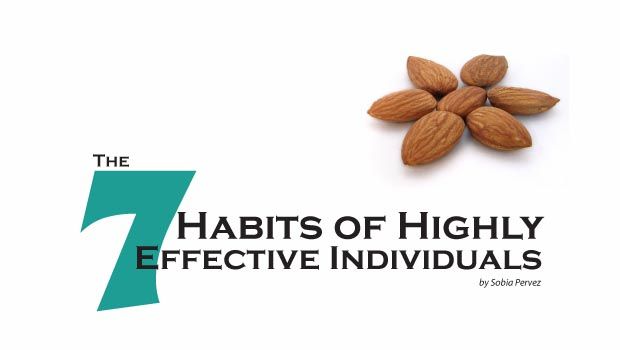One important lesson that we can learn from the Sahaba is that their successes were due to the fact that they were God–conscious individuals. They were committed to ensuring that the directives by Allah (SWT) and the Prophet (pbuh) were translated into action with minimal inconsistencies. They demonstrated that change for the better must begin from within. The Quran confirms this, “Allah (SWT) will not change the condition of a people until they change it themselves” (Al-Quran, 13:11).
This article is based on the seven habits outlined by Sean Covey in his book, The 7 Habits of Highly Effective Teens. In general, we know that habits can be constructive or destructive. To be an effective person, there are certain habits that we as individuals should possess. The following is an overview of some of these habits that will make us successful in this world and the hereafter, InshaAllah:
HABIT #1: Proactive vs. Reactive
The first habit that we will focus on is to be proactive. What does it mean to be proactive? It means to take responsibility for your life. There are two kinds of people who live in this world–the proactive and the reactive, those who take responsibility for their lives and those who blame, those who make things happen and those to whom things happen. Being proactive is the first step toward achieving the private victory that you have been struggling with.
Each day, you have a choice of being proactive or reactive. There are many scenarios that take place on a given day such as the weather being bad, you cannot find a job, you have to pay the bills, you fail a test, and many more. The question is: what are you going to do about it? Are you in the habit of reacting to these kinds of everyday things, or are you proactive? The choice is yours!
The Prophet (pbuh) cautioned us to control our emotions. He emphasized that we should not be reactive, but to show our strong character by taking control of testing situations. “The strong is not the one who overcomes the people by his strength, but the strong is the one who controls himself while in anger” (Bukhari).
If you have a firm conviction of the final consequences of your acts, then you will look upon all worldly gains and losses as temporary and would not stake your eternal happiness for a transitory gain
You do not have to respond the way everyone else does or the way people think you should. Reactive people make choices based on impulse. If life shakes them up a bit, the pressure builds, and they suddenly explode like a soda can. On the other hand, proactive people make choices based on values. They think before they act, and they recognize that they do not have control over things, but they control what they do about it. You can shake them up all you want but their reaction is always calm, cool, and in control of the situation.
HABIT #2: Begin with the End in Mind
The second habit we will discuss is to begin with the end in mind. You might be wondering what this means. It signifies that you should define your mission and goals in life and control your own destiny or someone else will. Habit number two suggests that you must develop a clear picture of where you want to go with your life. It means deciding what your values are and setting goals. Habit one says that you are the driver of your life, not the passenger. Habit 2 says that since you are the driver, decide where you want to go and draw a map to get you there.
Remember, the Quran constantly reminds us of our end. “Everyone is going to taste death, and we shall make a trial of you with evil and with good. And to us you will be returned” (Al-Quran, 21:35).
Why is it important to have an end in mind? If you believe in the Hereafter and have a firm conviction of the final consequences of your acts, then you will look upon all worldly gains and losses as temporary and would not stake your eternal happiness for a transitory gain. You will look upon things in their wider perspective and will always keep the everlasting benefit or harm in view. You will do the good, however costly it may be in terms of worldly gains, or however injurious it may be to immediate interests. You will also avoid the wrong, however charming it may look. You will judge the things from the viewpoint of their eternal consequences and would not submit to your whims and desires.
Sometimes you are at critical crossroads in life, and the path you choose can affect you forever. If you do not decide your own future, someone else will do it for you. Since we do not want anyone else to decide our destiny, what can we do? We can write a personal mission statement. A personal mission statement is like a personal motto that states what your life is about. It is like a blueprint to your life. There are many types and varieties of mission statements. Let us look at a few and, at the end, you can decide which one suits you the best.
·
- Inspiration from Quran/Hadith: Collect one to five of your favorite quotes and write them down. The total of these collections becomes your mission statement.
· The Brain Dump: Speed-write about your mission for fifteen minutes. Do not edit what you are writing; just keep writing. After your brain has let everything out, then take another fifteen minutes to edit, arrange, and make sense of your brain dump. The result is that you have a rough draft of your mission statement. Then over several weeks, you can revise it, add to it, clarify it, or do whatever else you need to inspire you.
· The Retreat: Go to a place that you love and where you can be alone. Think about your life and what you want to make of it.
The most important question to ask is, “Does it inspire me?” If your answer is yes, your mission statement is complete. Always keep Jannah as your goal, and remember we all will taste death. Make your life extraordinary!
HABIT #3: Put First Things First
When we study the life of the Prophet (pbuh), we realize immediately that he was a goal-oriented and task-oriented individual. He always prioritized his tasks and tackled them with utmost efficiency.
When we study the life of the Prophet (pbuh), we realize immediately that he was a goal-oriented and task-oriented individual. He always prioritized his tasks and tackled them with utmost efficiency
Habit 3 is exactly that. This habit requires us to prioritize and do the most important things first. We must prioritize what Allah (SWT) and his Messenger (pbuh) have prioritized and put off what Allah (SWT) and his Messenger (pbuh) have put off. We should prioritize Salah to be an important concern of ours. Our day should be organized around the five daily prayers. On a weekly basis, we can plan how often we want to fast, or identify how we will give charity, etc.
It is the habit of will-power (the strength to say yes to the most important things) and won’t power (the strength to say no to less important things and to peer pressure). The better you organize yourself, the more you will be able to do—you will have more time for family and friends, more time for school, more time for yourself, and more time for the most important things. There is a model that you can work with that will help you pack more of the important things. It is made up of two primary ingredients, important and urgent.
- · Important: The most important things, the first things, activities that contribute to your mission and your goals
· Urgent: Pressing matters, in-your face things, activities that demand immediate attention
Urgent things are not necessarily bad, but the problem comes when we become so focused on urgent things that we put off important tasks that are not urgent, like working on a report in advance. There are some things you can do that will make you become more organized with your time and lifestyle.
You can get a planner and plan weekly. You can take fifteen minutes each week to plan your week and watch the difference it can make. It is better to plan weekly because we think in weeks, and because daily planning is too narrow a focus, and monthly planning is too broad a focus. When your weekly plan is in place, adapt each day as needed. You might have to rearrange what is important with what is urgent for your plan to work. Try your best to follow your plan, but if you do not accomplish everything you set out to do, it is okay.
HABIT #4: Think Win-Win
To think win-win means to have an “everyone-can-win” attitude. When we think of a win-win attitude, we will always have positive feelings and will say, “I can win, and so can you.” It is not just me or you, but it is both of us. It begins with the belief that we are all equal and that no one is inferior or superior to anyone else, and no one needs to be. When you think win-win, you have positive feelings towards yourself and others.
The Prophet (pbuh) has highlighted this principle when he said, “…the duaa of a Muslim for his brother (in Islam) in his absence is readily accepted, and an angel is appointed to his side; whenever he makes a beneficial duaa for his brother, the appointed angel says ‘Ameen and may you also be blessed with the same’” (Muslim).
As believers, we can always be winners. The Messenger of Allah (pbuh) said, “How wonderful is the affair of the believer, for all of it is good, and that applies to no one except the believer. If something good happens to him, he gives thanks, and that is good for him, and if something bad befalls him, he bears it with patience and that is good for him” (Reported by Muslim).
HABIT #5: Seek First to Understand, Then To be Understood
Listen to people sincerely. The deepest need for a human being is to be understood. Everyone wants to be valued and respected for who they are. Everyone is a unique, one-of-a-kind individual. We need to sincerely listen to people to truly appreciate who they are and what they need. When people talk, we seldom listen because we are getting ready to respond, to judge, or to filter their words through our own ideas.
We need to genuinely listen to people. How can we do this? We can first listen with our eyes, heart, and ears. Listening with our ears is not enough, because only seven percent of communication is contained in the words that we use. The rest comes from body language (53%) and how we say words (or the tone and feeling reflected in our voice) (40%). To hear what people are saying, you need to listen to what they are not saying. You have two ears and one mouth—use them accordingly.
Allah (SWT) gives us a simple rule of thumb: “Not equal is the good response and the bad response. You shall resort to the nicest possible response. Thus, the one who used to be your enemy may become your best friend” (Al-Quran, 41:34).
HABIT # 6: Synergize
Work together to achieve more. What does synergize mean in a nutshell? Synergy is achieved when two or more people work together to create a better solution than they could have created alone. It is not your way or my way, but a better way. Synergy is celebrating differences, teamwork, open-mindedness, and finding new and better ways.
The Quran instructs us, “…And cooperate in righteousness and piety, and do not cooperate in sinfulness and transgression. Have fear of Allah, for Allah is strict in enforcing retribution” (Al-Quran, 5:2).
Synergy does not work when there is ignorance, cliques, and prejudice. Ignorance means that you do not know what people believe, how they feel, or what they have been through. Cliques are okay because you want to be with people that you are comfortable with, but it becomes a problem when the people you interact with begin to reject everyone who is not like them. Prejudice is something we are not born with, but is learned. We are all created equally, but, unfortunately, we are not treated equally. Racism is one of the world’s oldest problems and Allah (SWT) did not put us on this Earth to be prejudiced, but to stick up for diversity and learn to understand the human race.
HABIT #7: Sharpen the Saw
Renew yourself regularly. Habit seven is keeping your personal self sharp so that you can better deal with your life. It means regularly staying up to date with the four key dimensions of your life—your body, your brain, your heart, and your soul. To enhance your performance, you need to strive for balance in all four areas:
- · Body-The Physical Dimension—Exercise, eat healthy, sleep well, and relax
· Brain-The Mental Dimension—Read, educate, write, and learn new skills
· Heart-The Emotional Dimension—Build relationships, give service, laugh
· Soul-The Spiritual Dimension—Pray, keep a journal, reflect on Quran, take in quality media
The best thing that you can do for yourself is rejuvenate and take time out for yourself to relax. Islam teaches us to take care of ourselves so that we are at our best when it comes to important relationships in life, like our relationship with our Creator, our families, our local communities, and others.
To achieve all of the above steps, you have to make them a habit. A habit can make you or break you. An English poet once said, “We first make our habits, then our habits make us.” Therefore, take control of your life and form habits that will make you successful in this world and in the hereafter, InshaAllah.





